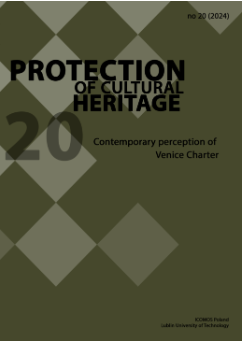Odtwarzanie rdzennej wiedzy architektonicznej Archipelagu Arktycznego i Norwegii
Nancy Mackin
nancy@mackinportfolio.comUniversity of British Columbia, Vancouver; University of Victoria, Victoria; (Kanada)
Abstrakt
Mieszkańcy obszarów autochtonicznych, takich jak Gwich’in, Inuvialuit, Copper Inuit, Sami i Coast Salish, przez pokolenia obserwacji i eksperymentów nauczyli się tworzyć specyficzną dla miejsca architekturę biomimetyczną. Aby dowiedzieć się więcej o dziedzictwie autochtonów, a także jego wpływie na architekturę, w procesy rekonstrukcji tradycyjnych schronień zaangażowano rdzennych ekspertów (Eskimosi, przedstawiciele Pierwotnych Narodów). Podczas rekonstrukcji zarówno młodzież, jak i starszyzna wyrażali entuzjazm i dumę z pomysłowości i użyteczności myśli architektonicznej swoich przodków. Niektóre ze zbudowanych podczas tych badań konstrukcji wciąż istnieje i służy jako schronienia awaryjne dla zbieraczy żywności. Podczas ekstremalnych warunków pogodowych schroniska mogą stanowić potencjalną sieć osadniczą zbieraczy, która umożliwiłaby rewitalizację tradycyjnych szlaków żywnościowych. Rekonstrukcje wykazują, że materiały budowlane, formy, technologie montażu i inne aspekty rdzennej architektury stanowią cenne źródło informacji dla przyszłych pokoleń architektów.
Słowa kluczowe:
ludność autochtoniczna, architektura Arktyki, architektura inuicka, rekonstrukcja, dziedzictwoBibliografia
Hadlari A. Personal communication, April 7-9 2016, Inuit knowledge-holder, Cambridge Bay NU Canada.
Google Scholar
Mackin N., Moss Houses in the Circumpolar North: Architectural Traditions and Innovations That Respond to Climate Change. International Journal of Climate Change: Impacts and Responses Volume 8, Issue 2, pp.1-14, 2015.
Google Scholar
Emmons R., An Investigation of Sami Building Structures. Sami Culture, University of Texas , Online https://www.laits.utexas.edu/sami/dieda/anthro/architecture.htm#Thermal, 2004.
Google Scholar
Sjølie R., The Sami Goahti, an Earthen House in the Arctic. Vernacular Architecture and Earthen Architecture: contribution for sustainable architecture. The Sami Goahti, an Earthen House in the Arctic, Taylor and Francis Group: London, 71-76, 2014.
Google Scholar
Auroville Earth Institute UNESCO Chair Earthen Architecture, Stability Notions, On-line http://www.earth-auroville.com/stability_notions_en.php
Google Scholar
Fehr A. &Andre A., Gwich’in Ethnobotany, Gwich'in Social and Cultural Institute and Aurora Research Institute: Inuvik NWT Canada, 2002.
Google Scholar
Gruben P. Personal communication, Inuvialuit knowledge-holder, Dec. 18 2014, Aklavik NWT Canada.
Google Scholar
English M. Personal communication, Inuivialuit knowledge-holder, Dec. 2015, Inuvik NWT Canada.
Google Scholar
Jerome J. Personal communication, Inuivialuit knowledge-holder, Dec. 2015, Inuvik NWT Canada.
Google Scholar
Lee M. & Reinhardt G. T., Eskimo Architecture: Dwelling and Structure in the Early Historic Period, University of Alaska Press: Fairbanks AK, 2002.
Google Scholar
Kershaw G. P. , Scott P. A., Welch H. E., The Shelter Characteristics of Traditional-Styled Inuit Snow Houses, Arctic Vol. 49, No. 4 (December 1996) P. 328 – 338, 1996.
Google Scholar
Handy R. L., The Perfect Dome, American Scientist May-June 2011, Online http://www.americanscientist.org/issues/pub/2011/3/the-perfect-dome
Google Scholar
Monreal A., Catenary or Parabola, who will tell? DIMACS entre for Discrete mathematics and theoretical computer science, online http://www.cs.rutgers.edu/~mcgrew/dimacs/slides/Amadeo_Huylebrouck.pdf
Google Scholar
Inuvialuit Elders with Robert Bandringa, Inuvialuit Nautchiangit: Relationships between people and plants, Inuvik: Inuvialuit Cultural Resource Centre, 2010.
Google Scholar
Senosiain J., Bio-architecture, Architectural Press: Oxford, 2003.
Google Scholar
Gunvar Gutorm, Árbediehtu (Sami Traditional Knowledge) as a concept and in practice, Diedut 1 2011, Sámi allaskuvla / Sami University College 2011, 59–76. On-line at https://brage.bibsys.no/xmlui//bitstream/id/165652/Diedut-1-2011_GunvorGuttorm.pdf
Google Scholar
Autorzy
Nancy Mackinnancy@mackinportfolio.com
University of British Columbia, Vancouver; University of Victoria, Victoria; Kanada
Statystyki
Abstract views: 357PDF downloads: 217 PDF downloads: 216
Licencja

Utwór dostępny jest na licencji Creative Commons Uznanie autorstwa – Na tych samych warunkach 4.0 Miedzynarodowe.








